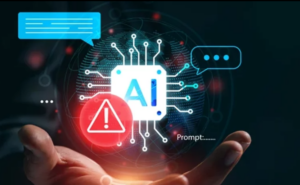 Cybersecurity is one area where it becomes easy to compare before and after AI with tangible results in the prospect. AI And Cybersecurity Risks are a significant issue but AI has been helpful in places such as threat detection & response, and comprehensive security measures. The introduction of AI in cybersecurity comes with risks and challenges as well, which is why you should take care not to turn every opportunity into one.
Cybersecurity is one area where it becomes easy to compare before and after AI with tangible results in the prospect. AI And Cybersecurity Risks are a significant issue but AI has been helpful in places such as threat detection & response, and comprehensive security measures. The introduction of AI in cybersecurity comes with risks and challenges as well, which is why you should take care not to turn every opportunity into one.
AI And Cybersecurity Risks include Adversarial attacks where AI models can be fooled into making the wrong prediction, or having the incorrect output when put up against some slightly “contaminated” data input. This includes attempting to trick an AI-based security system into misidentifying an attack by slightly changing one pixel in text or image. Such an attack highlights the susceptibility of AI algorithms to deep fake technologies.
One of the other big dangers is it being used to exploit AI systems. Given the increasing presence of AI in cybersecurity systems, they will also prove very tempting targets for cybercriminals. This is so important, not only because it helps secure the data contained within those systems from unauthorized access; but also enables operators to demonstrate their reliability in identifying and mitigating threats which are inherently difficult when utilizing traditional methods for monitoring security. In this case, if an AI system managing or monitoring network traffic were to be compromised then the attackers could train and execute a model guiding disregard of some malicious activities, generating effectively blind zones in security infrastructure.
AI And Cybersecurity Risks include the most important problem data poisoning. It’s like trying to trick a computer into thinking something is true when it’s false. Think of it as teaching a lesson in intelligence to the computer. We feed it a lot of data, like an instructor educating in a school class. However, a good teacher depends on quality books and the computer for quality information. If we show wrong information, it will ingest the data in the same manner. Therefore, we need to be careful about what is taught on the computer.
However, the deployment of AI has its implications to involve security and privacy issues. Collection, storage, and processing of such data can lead to privacy issues if not handled with proper management. This risk should be managed properly by organizations that must comply with all the regulations, which means they have to put strict measures of protection around their data.
That was the equivalent of an AI bodyguard. Your system will quickly recognize threats and defend you from every type of cyber-attack. But like all superheroes, it does have a Kryptonite. Even then we can not let all this progress go to waste, as the same AI can also be abused by bad actors for avoiding security. Think of it as a war between good and evil, never-ending at that… using super smart computers to outwit each other. Therefore, as much as we like AI is good, we need to use it wisely and be ready for new threats.

No Comments
Leave Comment